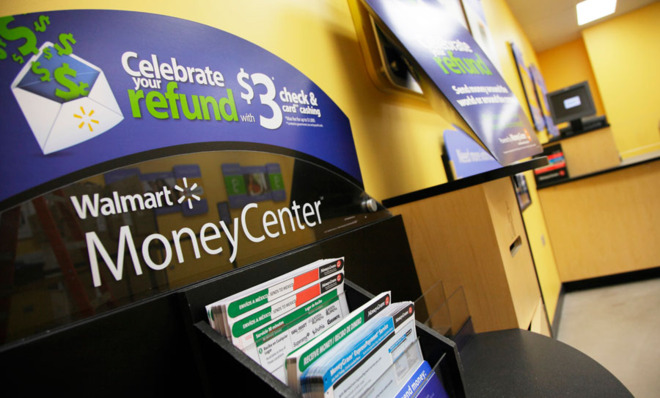Walmart wants to open a bank. Could it actually help people?
It all depends on how you crunch the numbers


A free daily email with the biggest news stories of the day – and the best features from TheWeek.com
You are now subscribed
Your newsletter sign-up was successful
Walmart is the world's largest retailer, a status it earned by putting every product a shopper could conceivably need under one roof. For years, though, one major area of consumer activity had proven elusive for the Bentonville giant: financial services.
That's set to change in late October, when Walmart will begin offering basic transactional accounts under the brand name GoBank, through a partnership with Green Dot Bank.
To some, Walmart's focus on the financial needs of low-income customers could prove an effective strategy to reduce the number of "unbanked" or "underbanked" Americans. Those are the nearly 10 million U.S. households that rely largely on "alternative financial services" — predatory institutions like check cashers and payday lenders that charge exorbitant rates for their services.
The Week
Escape your echo chamber. Get the facts behind the news, plus analysis from multiple perspectives.

Sign up for The Week's Free Newsletters
From our morning news briefing to a weekly Good News Newsletter, get the best of The Week delivered directly to your inbox.
From our morning news briefing to a weekly Good News Newsletter, get the best of The Week delivered directly to your inbox.
Yet others are skeptical of Walmart's intentions, instead seeing a clear attempt by one of the world's largest corporations to profit further from its poorest customers' lack of banking options.
The truth lies somewhere in between. While GoBank could give many thousands — perhaps even millions — their first convenient access to financial services, its limitations also reveal just how serious the problem is.
Preempting postal banking
To be sure, the benefits of the GoBank account are clear.
A free daily email with the biggest news stories of the day – and the best features from TheWeek.com
The fee structure is simple and, compared with checking accounts at many traditional banks, relatively limited in scope. There is a $9 monthly service charge, for example, that Walmart will waive if at least $500 in monthly direct deposits are made.
And, perhaps most importantly, customers will need only a state-issued ID to sign up, thanks to Green Dot's "proprietary underwriting techniques."
This low-cost, no-frills approach toward basic financial services is similar to the "postal banking" system that some say the U.S. Postal Service should offer.
Its head start notwithstanding, though, Walmart's move has the potential to completely preempt any new banking service the Post Office might develop.
That's because the idea that the Post Office could both help America's unbanked and make the institution financially solvent could prove a contradiction in terms, as Adam Levitin wrote in American Banker a few months ago. Either the USPS will offer affordable financial products (and in doing so continue to lose money), or it will profit from them in defiance of the social goals that sparked the idea in the first place.
Walmart has no such dilemma. As the economist Adam Ozimek noted in Forbes, the retail giant can well afford to lose money on its banking division because its overarching purpose is to capture customers. While a GoBank member could in theory buy the "starter pack" at a local Walmart and never set foot in one again, the product is clearly aimed at consumers who are likely to become frequent Walmart shoppers (if they aren't already).
Rural reach — a Walmart special
But will a Walmart-based bank actually provide better access to financial services in the areas that need it most?
It all depends on how you crunch the numbers. On the one hand, the parts of the country where Walmart is most established also tend to have higher proportions of unbanked or underbanked people.
Nowhere is this more true than in Arkansas, Walmart's home state, which has both the most Walmarts per capita and the highest percentage of unbanked households in the country. Among the state's blacks, a 2011 survey by the FDIC found that an astounding 72 percent of households either have no bank account at all, or have one but still use predatory "alternative financial services."
Given that 55 percent of black households in Arkansas live in a ZIP code with a Walmart, the retailer's dominance there could go a long way toward reducing the proportion of unbanked and underbanked people. (Among Arkansas whites, who are more "banked," the figure is 57 percent.) The situation is comparable in states like Mississippi and Alabama.
Moreover, it's reasonable to assume that Walmart — which sells everything from gas to groceries — would be a more convenient banking option than the Post Office.
The urban unbanked
But if you look at raw numbers rather than percentages, Walmart's efforts probably won't do nearly as much.
That's because lack of access to financial services remains above all a problem endemic to American cities, where Walmart hasn't made as big an impression.
According to the FDIC survey, half of America's unbanked live in just 10 metropolitan areas. Among these, only Dallas has a presence of Walmarts per capita that is above the statewide average.
Solutions will start at the top
The reality, of course, is that many of the urban unbanked live closer to a bank branch than they do a Walmart (or, for that matter, a post office).
That's why advocacy must concentrate not on where people's money goes but rather where it comes from, through legal reforms that would make it an employers' responsibility to provide basic checking for employees who are not already eligible for direct deposit.
A key part of this effort would be restricting fees associated with deposits, withdrawals, and purchases associated with basic FDIC-insured transactional accounts.
Ironically, this is a problem with which many Walmart employees are intimately familiar.
For workers who don't already have a bank account with direct deposit, the company issues Money Network–branded debit cards with unusual restrictions and fees.
For starters, cardholders only get one free ATM withdrawal every pay period. After that, the only place they can withdraw or deposit money is — wait for it — at a Walmart cash register. Meanwhile, they cannot have a balance of more than $8,000, and if they stop working for Walmart, they have 60 days to withdraw their money before a more severe fee schedule goes into effect. (Of course, Walmart employees will soon be able to rid themselves of the Money Network cards by opening a GoBank account after they get off work.)
The fact that Walmart is pitching easy-to-use checking accounts to customers while shortchanging its own employees speaks to how entrenched our country's banking problems really are.
Ultimately, any comprehensive campaign to help the unbanked must focus on making bank-account ownership not just convenient, but unavoidable.
To be sure, the new GoBank accounts are a nice carrot. But to really help America's unbanked, we need to give employers the stick.
Jacob Anbinder is a policy associate at the Century Foundation, the New York-based think tank. He writes about transportation, infrastructure, and urban affairs.
-
 Trump touts pledges at 1st Board of Peace meeting
Trump touts pledges at 1st Board of Peace meetingSpeed Read At the inaugural meeting, the president announced nine countries have agreed to pledge a combined $7 billion for a Gaza relief package
-
 Britain’s ex-Prince Andrew arrested over Epstein ties
Britain’s ex-Prince Andrew arrested over Epstein tiesSpeed Read The younger brother of King Charles III has not yet been charged
-
 Political cartoons for February 20
Political cartoons for February 20Cartoons Friday’s political cartoons include just the ice, winter games, and more
